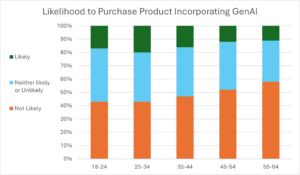Consumers are increasingly exposed to products featuring generative AI capabilities, but many are not actively seeking out or using these features. Hesitation is driven by several factors: trust concerns, privacy and security fears, limited understanding of AI, and a need for clear demonstrations of how these technologies will genuinely improve their lives. Until these concerns are addressed, consumer excitement for AI-powered solutions remains muted.
We asked 500 consumers about their likelihood of purchasing a product with generative AI, and only 15% said they were likely to do so. 49% indicated they were unlikely to consider such products, with reluctance highest among older consumers.

Rationale for the lack of interest in purchasing AI products often is focused on lack of trust, not knowing enough about AI, fears about whether AI is dangerous and not seeing a need for AI.
- “I am afraid of AI and do not trust it.”
- “AI is only as good as the people who make/program it and I don’t necessarily trust them.”
- “I don’t have any need for the features, and also realize that while using those features I am providing data to the engine.”
- “I don’t think it’s working right yet. All hype.”
- “I just don’t think its reliable or useful yet. Too early.”
- “Don’t feel I have the need to use such a service.”
Lack of Trust in AI
One of the key reasons consumers are hesitant about generative AI is a general lack of trust in the technology. In our research, 22% of respondents cited trust as a significant concern when considering AI-powered products. Interestingly, this concern was fairly consistent across age groups, indicating that trust in AI is not just an issue for older generations, but rather a cross-demographic challenge. The opaque nature of AI, where it often feels like a “black box” producing decisions without clear explanations, amplifies these concerns. Consumers worry about the reliability, fairness, and transparency of AI systems, leaving them skeptical about its value.
In addition to the trust factor, there is a growing sentiment around the ‘lack of need’ for AI-powered features. Many consumers remain unconvinced that AI adds meaningful value to their daily lives. Without clear and compelling demonstrations of how AI can improve their experiences, this technology may be seen as more of a luxury than a necessity. Bridging this gap requires companies to not only build trust but also clearly show the real-world benefits of AI to drive adoption.
Privacy and Security Concerns
Privacy and security are major sticking points. Generative AI systems often rely on massive datasets, some of which can include sensitive personal information. Consumers are aware of how companies collect, store, and use data, which makes them wary of products that could compromise their privacy. They are cautious about engaging with tools that could expose their personal information or have the potential to misuse data. Furthermore, headlines about data breaches, unauthorized surveillance, and misuse of AI by corporations only amplify these fears. The idea of handing over private data to technology companies that create AI systems, even for personalized experiences, feels like a significant risk for many consumers.
Lack of Understanding of AI
For many consumers, AI remains an abstract and complicated concept. The technical intricacies of how these technologies function are often lost on the average user. This knowledge gap can lead to reluctance in exploring or embracing AI-based features, simply because people do not understand how these features work or how they could improve their lives. Without a clear understanding of the practical benefits, consumers may feel overwhelmed or uncertain about how to use AI tools effectively. This lack of comprehension creates a barrier that prevents them from actively seeking out generative AI features in their purchases.
Need for Demonstrated Benefits
Many consumers require tangible proof of AI’s benefits before they are willing to adopt it. While companies often market AI as a way to enhance user experiences, there is sometimes a gap between these promises and users’ lived experiences. Consumers are less likely to pay for or actively seek out AI features if they don’t perceive a direct and meaningful impact on their lives. They need to experience firsthand how AI can improve efficiency, enhance creativity, or provide unique experiences. Without this real-world demonstration of value, AI features may be seen as unnecessary or gimmicky rather than essential components of a product.
Conclusion
To shift consumer attitudes and drive adoption of AI-powered products, companies should focus on these strategies:
- Educate consumers on GenAI: Provide simple and transparent information about how AI works, emphasizing the enhancement it provides to the user experience.
- Build trust in GenAI: Demonstrate how AI systems are safe, reliable and ethical. This includes a focus on strong privacy and security measures and clear communication about AI’s limitations.
- Offer AI as an optional enhancement: Let consumers experience the benefits of AI features without making them core functionalities. This allows them to appreciate the value of AI at their own pace.
- Highlight enhanced experiences over AI itself: Focus on personalization, convenience, improved efficiency, and enhanced experience to showcase the value AI can bring, rather than centering messaging around the technology itself.
About KS&R
KS&R is a nationally recognized strategic consultancy and marketing research firm that provides clients with timely, fact-based insights and actionable solutions through industry-centered expertise. Specializing in Business Services, Telecom, Entertainment & Recreation, Healthcare, Retail & E-Commerce, Technology, and Transportation & Logistics verticals, KS&R empowers companies globally to make smarter business decisions. For more information, please visit www.ksrinc.com.


